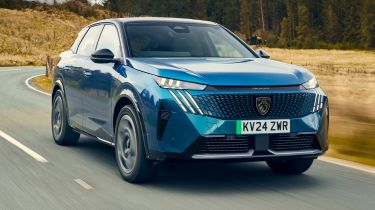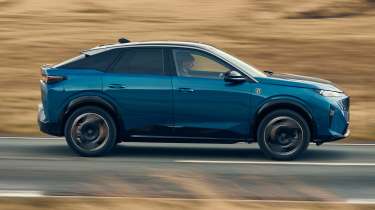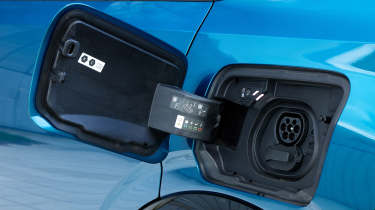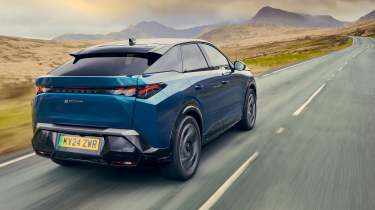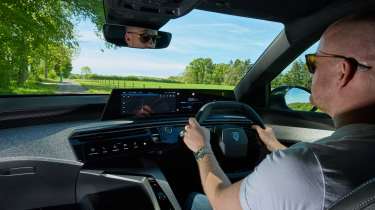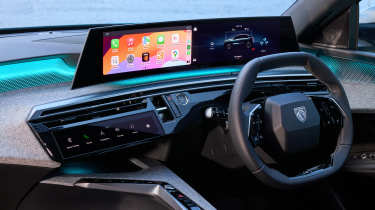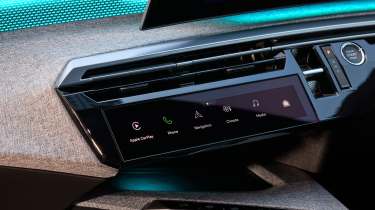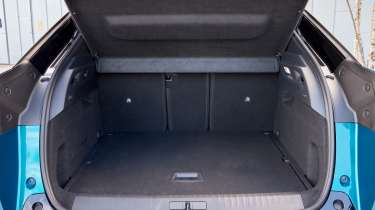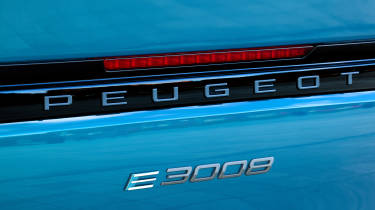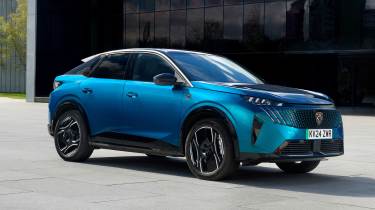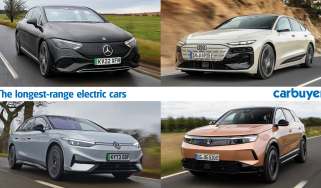Peugeot E-3008 review – an impressive range, but disappointing performance
“The Peugeot E-3008 is a good car, but it’s expensive and doesn’t move the game on enough”
Pros
- Impressive range
- Beautiful, premium interior
- Practical
Cons
- Harsh ride
- Lacklustre performance
- Expensive
Verdict – is the Peugeot E-3008 a good car?
We think the Peugeot E-3008 is by no means a bad car, but expectations were high given its quirky, futuristic design and interior and hype surrounding its underpinnings. The reality is, though, that its performance is rather average and the steering feels a bit odd, while the ride is firm for a car of this type. The expensive price tag is also an issue, but competitive finance may help ease that last issue slightly.
Peugeot E-3008 models, specs and alternatives
While the Peugeot 3008 has been around for three generations now, starting out as a family-friendly MPV, then morphing into a mid-size SUV last time around, this most recent version is more of a coupe-SUV. The Peugeot E-3008 badge represents the first time the family SUV has been given electric underpinnings, which should appeal to buyers wanting lower running costs.
The Peugeot E-3008 has arrived into a hugely competitive class that didn’t exist a decade ago, but the brand’s reinvented premium image is what it will be hoping appeals to buyers looking for something a bit different.
The latest Peugeot E-3008, like its petrol-powered counterpart, features a sleek new look featuring a sloping roofline that’s quite a departure from the upright proportions of its predecessor. At the front, it gets Peugeot’s trademark ‘three-claw’ LED lights on either side which are reminiscent of a lion’s scratch. The headlights themselves are very thin and angled downwards for an aggressive look. The rear is relatively minimalist, and rather than a Peugeot logo, the word ‘Peugeot’ is written on the rear light bar and ‘E-3008’ sits below this.
The E-3008 is one of the first cars from Peugeot and its Stellantis parent company to be based on a new electric car platform that will underpin a long list of future models from Vauxhall, Citroen, Alfa Romeo and other brands, so it’s a significant model that has a lot riding on it.
|
Trim levels |
Power options |
|
|
Range, charging & running costs
One of the most impressive things about the Peugeot E-3008 is its on-paper range figure. This mid-size coupe-SUV is capable of covering up to 435 miles on a single charge in Long Range guise. However, even the entry-level Standard Range’s 326-mile figure is impressive, coming close to the top-spec Skoda Enyaq’s 348-mile range.
The E-3008 is even equipped with fast charging technology, so you won’t have to wait long when you do need to charge up, either. Its fastest 160kW charging speeds are better than the speeds offered in the Renault Scenic (150kW) although they’re still slightly behind those of the Tesla Model Y or Hyundai Ioniq 5. Still, that should be quick enough for a 20-80% top up in just 30 minutes.
|
Model |
Battery size |
Range |
|
Peugeot E-3008 Standard Range |
73kWh |
326 miles |
|
Peugeot E-3008 Long Range |
98kWh |
435 miles |
|
Peugeot E-3008 Dual Motor |
98kWh |
TBC |
How efficient is the Peugeot E-3008 in the real world?
During our drive of the Peugeot E-3008, we managed to achieve roughly 307 miles to a charge, which is not bad at all, considering the official range for our test car was 326 miles. Bear in mind that not adding the optional heat pump may decrease your real-world range in wintry conditions, so it’s worth paying the extra for.
What will the Peugeot E-3008 cost to insure?
Insurance groupings for the Peugeot E-3008 are yet to be confirmed, but competitors such as the Skoda Enyaq (and Enyaq Coupe) span groups 23 to 36 (for the performance vRS model), but the Tesla Model Y sits in groups 48 to 50. It’s hard to hypothesise where the Peugeot E-3008 might sit, but because of its slightly premium image it’s likely it will sit between these two competitors in terms of insurance cost.
Electric motor, drive & performance
One of the first things you’ll notice stepping into the Peugeot E-3008 is its quirky driving position and small steering wheel. It’s now a Peugeot trademark and certainly makes the E-3008 stand out against rivals in this regard, but we recommend sitting in the car to check you’re a fan of this setup before you buy.
Unfortunately, we were largely unimpressed with the E-3008’s driving experience. We found the steering to have an odd, unnatural feeling to it. Put it into sport and the steering gets heavier, but not necessarily more engaging.
Through a series of corners, it does feel nimble, but it comes at a significant cost to the car’s ride. It’s far too firm for a family SUV and transmits a lot of imperfections from the road into the car’s cabin and seats.
On the positive side, the E-3008 is a very refined car, so it’s quiet inside thanks to good sound deadening and a lack of wind and engine noise. The regenerative braking is good, too, and we like the paddles on the steering wheel that allow the driver to quickly and easily adjust its intensity – it’s still not quite strong enough for one-pedal driving, but it’s not far off, and much more potent than other cars from parent-company Stellantis.
Is the Peugeot E-3008 good to drive in town?
The entry-level E-3008 Standard Range offers sprightly performance under 30mph, so it’s best suited to town driving in this respect, but unfortunately, the steering feels strange even at low speeds, and the ride is overly harsh, while potholes seem to be a bigger problem in town.
Is the Peugeot E-3008 good to drive on long journeys?
Our test car’s entry-level motor failed to feel punchy enough at motorway speeds, despite its power figure. A Dual Motor version is set to arrive later which should offer even more power and feel more capable on the motorway as a result, but we’ll reserve full judgment for when we try it. There are some useful features to make motorway driving more feasible, though, such as an E-Routes feature which calculates the best route to take considering your available range and distance between charging stations.
Is the Peugeot E-3008 good to drive on B-roads?
Unfortunately, we weren’t particularly impressed with the E-3008’s driving feel, and this will be apparent on B-road blasts. While it’s agile and composed through corners, our test car transmitted lots of bumps into the cabin on country roads, and it felt very fidgety. We found acceleration to feel rather underwhelming, contributing to a lacklustre B-road experience.
|
Model |
Power |
0-62mph |
Top speed |
|
Peugeot E-3008 Standard Range |
207bhp |
8.8 seconds |
105mph |
|
Peugeot E-3008 Long Range |
230bhp |
TBC |
TBC |
|
Peugeot E-3008 Dual Motor all-wheel drive |
320bhp |
TBC |
TBC |
Carbuyer notes
“As long as you’re not moving, the E-3008 is an impressive car. Unfortunately, the driving experience doesn’t live up to expectations.” John McIlroy, Editor-at-large
Interior & comfort
If you’ve owned or test-driven a recent Peugeot 308, E-308, or any of the brand’s models of late, then the E-3008’s interior will be very familiar. Peugeot has been on a journey to position itself as more upmarket than in the past, and its recent cabin designs have been futuristic and unique, with widespread use of quality materials.
The dashboard gets an elegant, swooping design cocooning the driver with a good blend of sporty and luxurious feel which is unlike any other interior in this market sector – we’d even go as far as to call it class-leading. The boomerang-shaped lower section of the Peugeot’s dashboard places a range of controls within easy reach, and we think the seats are comfortable and supportive
The E-3008’s ambient interior lighting looks fancy, but in its brightest mode it’s a bit overbearing at night. The option of an adaptive setting that dims in dark conditions would be a good idea for future updates.
Is the Peugeot E-3008 infotainment and navigation system easy to use?
Like the brand’s other models, the E-3008 gets Peugeot’s i-Cockpit digital driver’s display which works well. Unlike in the 308, the E-3008’s digital gauge cluster flows into the infotainment screen seamlessly as a 21-inch display. There’s a second display that shows customisable shortcuts below the air vents to help you jump quickly to certain features of the infotainment. Overall we like the infotainment, although some drivers may arguably find it’s positioned rather deep down on the dash making it more difficult to reach. Its curvature towards the driver also makes it harder for passengers to operate.
Our only other gripe is that, while the digital instrument panel is sharp, the graphics and fonts are slightly small and fussy to read at a glance.
Is the Peugeot E-3008 well equipped?
All versions of the Peugeot E-3008 get everything most drivers would think to ask for, but considering the price jump of almost £4,000 between Allure and GT models, we think the GT could do with more to make it stand out. It’s a bit disappointing that entry-level Allure costs just shy of £46k and doesn’t come with front parking sensors or heated seats, but considering this is the only real significant addition on the top-spec car, we’d still stick with Allure.
What options should you choose on the Peugeot E-3008?
We’d go for the Sensation Pack which comes in at £1,200 but adds a premium Focal sound system, opening glass roof and acoustic glass which improves refinement.
It seems a little stingy that a 360-degree camera is still an option on the GT model, as well as a heat pump. While we’d be happy to forgo the camera, the heat pump is a worthy addition – it helps the E-3008 by preconditioning and warming its battery in cold weather so it operates at optimal conditions and the range figure is better preserved. Heated rear seats and an airy panoramic sunroof can also be added as an option, and customers can opt to keep the Allure’s smaller 19-inch wheels on GT-spec cars (rather than the standard 20-inchers) which could help improve the stiff ride somewhat.
Key features | |
|
Allure
|
GT (Allure plus…)
|
Practicality & boot space
The Peugeot E-3008 is smaller than many rivals but it offers a lot of interior space for passengers, so it still feels spacious despite its swooping roofline. Granted, it’s not the most spacious mid-size electric SUV you can buy, but we doubt even six-foot-tall adults will have an issue with the rear space on offer. Perhaps the middle rear seat could be a little more generously sized, but a passenger sitting there would find it bearable for shorter trips.
|
Size comparison | |||
|
Model |
Length |
Width |
Height |
|
Peugeot E-3008 |
4,542mm |
1,895mm |
1,641mm |
|
Skoda Enyaq |
4,649mm |
1,879mm |
1,605mm |
|
Renault Scenic |
4,470mm |
1,864mm |
1,571mm |
|
Tesla Model Y |
4,751mm |
1,850mm |
1,600mm |
Does the Peugeot E-3008 have a big boot?
The Peugeot E-3008 is no class leader in terms of boot space, but it’s roomy enough with 520 litres on offer and is a good shape. Fold the seats down and you free up 1,480 litres which will be more than adequate enough for most buyers. If boot space is a priority, then rivals do have it pipped, with the Skoda Enyaq and Tesla Model Y offering a lot more.
|
Boot space comparison | |
|
Model |
Boot space |
|
Peugeot E-3008 |
520 litres |
|
Skoda Enyaq |
585 litres |
|
Renault Scenic |
545 litres |
|
Tesla Model Y |
854 litres |
Is the Peugeot E-3008 a good tow car?
The Peugeot E-3008 has a maximum braked trailer weight of 1,250kg, which isn’t loads, but enough for a small caravan, or a trailer to take garden waste to the tip, for example.
Reliability & safety
Reliability & safety
The latest Peugeot 3008 and E-3008 are too new to have featured on our latest Driver Power Customer Satisfaction survey, but Peugeot as a brand came in a respectable ninth place out of 32 manufacturers in 2023, beating sister brands Citroen (11th), Vauxhall (24th) and Fiat (31st) as well as rivals Renault (29th) and Skoda (20th).
It didn’t quite beat Tesla in third or Kia in sixth, but reliability scores were better, with just 19% of Peugeot owners reporting an issue with their car in the first year, compared to 25% of Kia owners and a worrying 40% of Tesla owners.
How safe is the Peugeot E-3008?
Neither the latest Peugeot 3008 nor the E-3008 have yet been tested by Euro NCAP to assess safety. It’s at least good to know, however, that lots of safety equipment is fitted as standard, such as autonomous emergency braking, Peugeot SOS & Assistance that calls out responders in an emergency and a driver attention monitoring system, as well as lane keep assist and traffic light recognition tech.
What are the Peugeot E-3008 service intervals?
Peugeot recommends servicing the E-3008 every 12 months or 10,000 miles, whichever comes first. The brand offers plans to spread the cost of servicing over monthly payments for up to 60 months – contact your local Peugeot dealer to check how much this would cost for a Peugeot E-3008 as the brand is yet to release servicing costs for this model specifically.
What is the warranty on the Peugeot E-3008?
The initial warranty for the Peugeot E-3008 is an industry-standard three years or 60,000 miles – whichever comes first. However, the E-3008 will be the first car offered by the brand to be covered for an additional two years or 15,000 miles each time it’s serviced by an official dealer for up to eight years or 100,000 miles – a warranty called Peugeot Allure Care. While that’s less than is possible with Toyota’s 10-year/100,000-mile warranty, you have to service your Toyota annually, or every 10,000 miles to ensure that warranty is valid. Kia also offers a competitive seven-year/100,000-mile warranty, while Hyundai offers cover for up to five years with no mileage cap.
Should you buy a Peugeot E-3008?
The Peugeot E-3008 sports a striking design – admittedly one that buyers will either love or hate – lots of space, a very competitive electric range and a beautiful cabin design. The problem is, that while these are worthy merits, the E-3008 fails to make as much of an impact as we’d have hoped in some other areas.
We’re living in a time where it’s almost expected that an EV should wow you with punchy performance, and unfortunately the E-3008 – at least in entry-level guise – fails to do this where other similarly-priced rivals can.
We’d love to argue that its agile driving dynamics and lack of body roll make up for this, but that also comes at the expense of ride comfort, which is a trait arguably more relevant to buyers of a family SUV.
It’s by no means a terrible car, but with many rivals making big strides in this area of the market in terms of innovation, we were expecting more from the E-3008; a car that’s hugely important for Peugeot and its parent company.
While it’s expensive, too, one saving grace is that strong finance deals do make the Peugeot E-3008 worthy of your consideration, so keep your eyes open if you think Peugeot’s family SUV could be the car for you.
What is the Carbuyer pick of the Peugeot E-3008 range?
With around £4,000 between the entry-level and top-spec E-3008 models at the time of writing, we’d stick to the entry-level Allure, which still feels well-equipped. It’s a shame that front parking sensors and heated front seats don’t come as standard on this £46k car, but it’s not worth the extra outlay for the GT model.
Peugeot E-3008 alternatives
The Peugeot E-3008 has arrived in a market blossoming with other EVs that offer a similar package but tend to blur the line between bodystyles. Like the E-3008’s coupe-SUV design, the Skoda Enyaq is offered as a Coupe variant, while there are similarly spacious EVs like the Kia EV6, Renault Scenic and the Tesla Model Y.
How we tested the Peugeot E-3008
We tested the Peugeot E-3008 on UK roads in May 2024 and then in a twin test against the Skoda Enyaq in July 2024.
Which Is Best?
Cheapest
- Name157kW Allure 73kWh 5dr Auto
- Gearbox typeAuto
- RRP£46,050
Most Economical
- Name169kW Long Range Allure 97kWh 5dr Auto
- Gearbox typeAuto
- RRP£48,750
Fastest
- Name169kW Long Range Allure 97kWh 5dr Auto
- Gearbox typeAuto
- RRP£48,750
